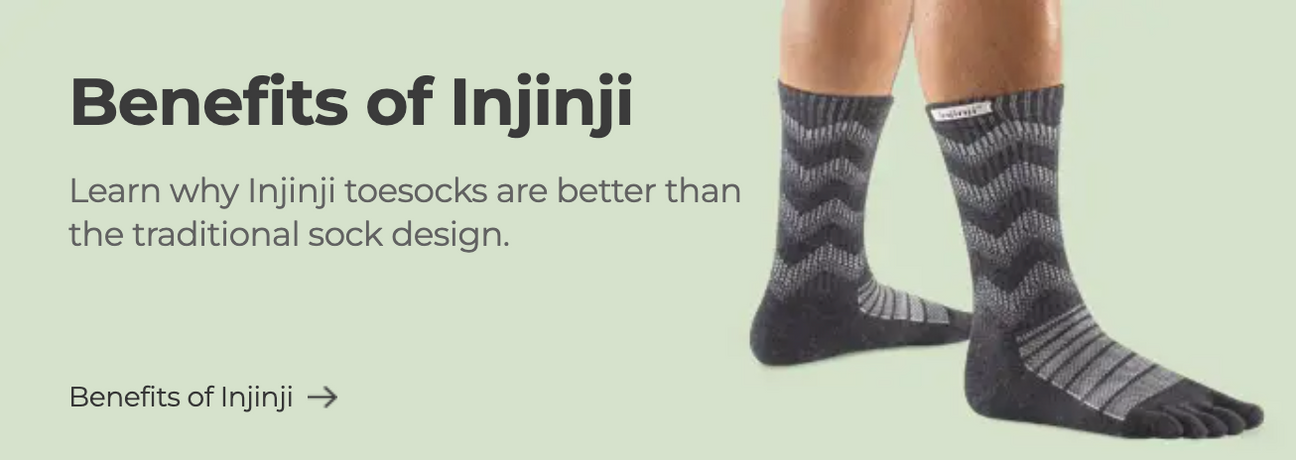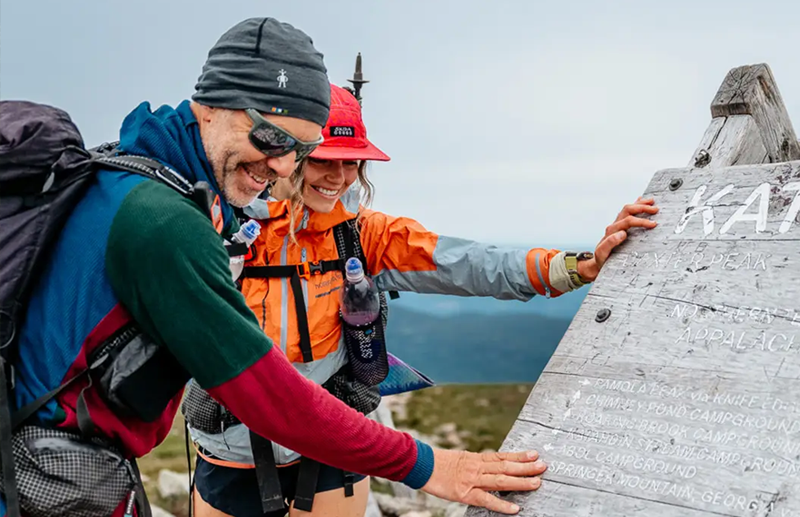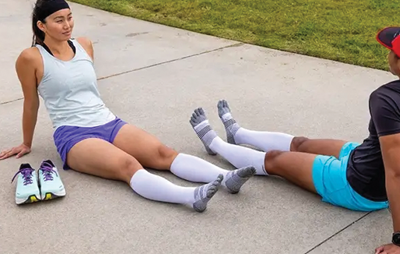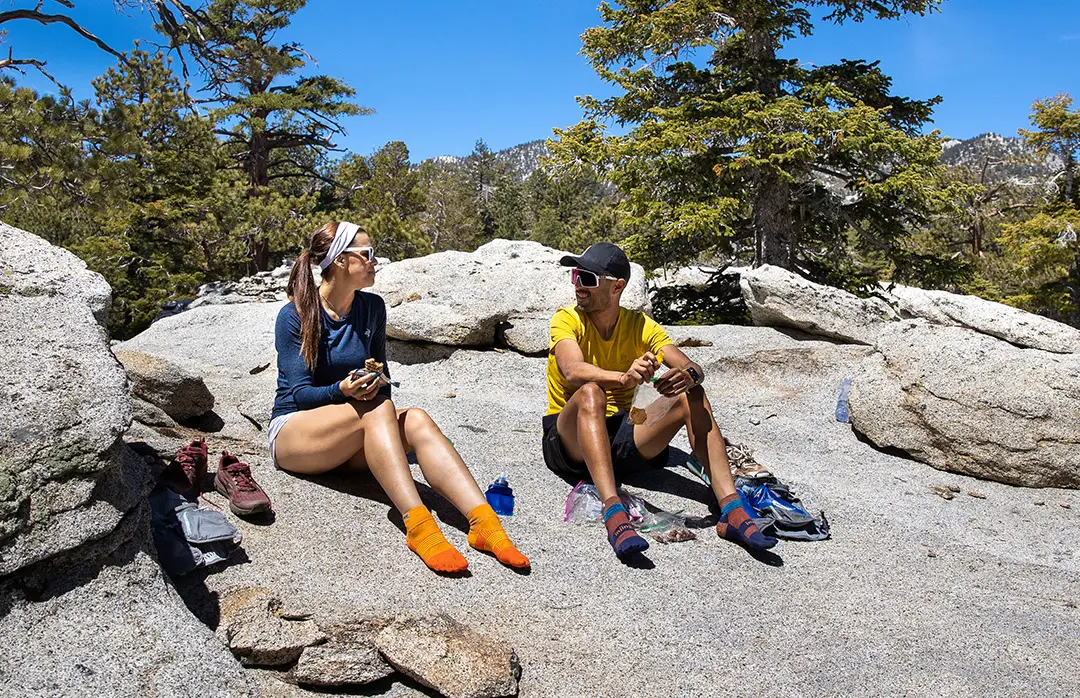When Team Injinji Athlete Tasha Swartley steps up to the start of an ultramarathon, she’s not chasing miles—she’s chasing meaning. A retired Navy veteran and licensed EMT, Tasha faced a steep climb after leaving the military. The weight of transition was heavy—until she found herself on dirt trails, surrounded by trees, silence, and a different kind of strength.
Trail running didn’t just heal her; it saved her life. After completing numerous ultras, she set her eyes on the Tahoe 200, a race as relentless as it is beautiful. In this conversation, Tasha opens up about the power of simply starting, the healing force of community, and how the trail helped her reclaim her story—one step at a time. She’s not done. Not even close.
Tell us about yourself. Can you give us a brief intro to who you are and how you got into trail running?
My name is Natasha Swartley, Tasha, aka THOR, the trail race medic. I am a US Navy Veteran, retired in August 2021 after serving 20 honorable years. These days, I support athletes in the trail running community as a race medic, licensed as an EMT. My trail journey began in 2015 when I was relocated to San Diego, CA. I began running recreationally in 2008, sticking to roads and building up to a full marathon in 2014. I ran my first ULTRA in 2019, the Tillamook Burn 50-mile event. My best friend Carrie (crewing me) and I were clueless to say the least on what it took to run ultras, but we made it, and I finished! 2020-2022 brought upon challenges between my career, covid, and my retirement. I did not do a whole lot of running then. I had a very low point in my life post-retirement, leading to near suicide, and found a way out and back to trail running, to which I contribute to this day as being what keeps me alive. Since 2022, I have worked my way up to accomplishing many ultras and some podiums and attempting my first 200-mile event in 2025.

Why did you sign up to run Tahoe 200 this year?
I’ve worked and volunteered with Destination Trail Races since 2023. I have felt deeply inspired by the many athletes and crew out there pushing their limits and allowing me to be part of their journey. My confidence needed time to grow before I ever considered enduring something so grand. After completing Folsom 100 in 2024, I felt enough courage to sign up for Tahoe in 2025. I found myself deeply dedicated to the journey and exploration of limits. I was curious about what my body could do. I don’t come from an athletic background, no sports growing up. Other than what the Navy mandated me to do for physical fitness, I simply found a love of running on my own. This was the first event my dad came out to see me run. For me, that was a HUGE deal. I wanted to introduce him to my trail family and see the life I have built for myself. He almost lost me a couple years ago after I battled suicidal issues, post-retirement, so to be here at this moment is a big ordeal. Having him here, seeing me in my prime, whatever that may be, was encouraging for both of us. I don’t think I have ever seen my dad cry…until now.
If your post-race self could give your pre-race self a piece of advice, what would it be?
I AM PROUD OF YOU. Crossing the finishing line doesn’t always have to be the goal… STARTING is the hardest part…for that, I AM PROUD OF YOU.
What was your lowest moment during the Tahoe 200, and how did you pull yourself out of it?
Facing the reality that my lungs couldn’t handle the breathing issue any longer and finding the courage to say, “I am not OK,” and turning around to go back to the aid station for a DNF. Accepting my defeat meant I had to make a HEALTHY decision for my body, and THAT is why I am ok with the choice I made…because it was healthy for me, and I can come back with more strength. According to my Garmin, I finished about 98.5 miles of the course…I am proud of that!
What’s one thing people don’t tell you about 200-milers?
It’s life changing. I am told this by many who come and attempt these. Yet, experiencing it is very different. It’s not something you can explain, it can only be FELT. That said, it is also POSSIBLE for anyone to do these events! It’s encouraging to see others of all body sizes and age range to be out here, fully immersed in Nature’s embrace.

Did you have a mantra, mindset shift, or mental tricks that helped you push through tough miles?
I have it tattooed on my right arm: “You chose to do this because you CAN, so you will… don’t f*cking quit.” I learned that a “why” we do this doesn’t have to be so complicated or deeply felt. It’s simply because we can…and to remind myself that our primal drive as humans is to move, so do it.
You’ve run lots of 100-milers in your athletic career. What were you most scared of when deciding to run a 200-miler?
The distance! The ability to do what I haven’t done before and venture into the unknown. The fear of not being able to do it. To get hurt. Be left alone. How my body will respond. I have done many hard things in my life. The US Navy taught me to have thick skin and be resistant against challenges…for me, ultimately the HARDEST thing and SCARIEST thing I felt was admitting I was not ok. It has been engrained in me that mission comes first and body second…now retired 4 years, I am allowed to take care of myself. So, admitting I wasn’t ok and pulling out of the “mission” if needed scared me and had me feeling that if I did that, I’d be seen as unworthy of love, respect and acceptance. At the end of this, I learned that none of that was true. In fact, it was very much the OPPOSITE…I was loved more because I took care of myself and others.
In your opinion, what is the biggest difference between a 100-mile and 200-mile race, besides the actual distance?
TIME! Consider this: You have 36 hours to complete 100 miles [in the Tahoe 200]. That’s FAST considering you have 105 hours to go double the distance. More than TWICE the time! However, it’s all utilized strategically! You NEED sleep in 200’s. I like to put it this way… There are rules to ultras:
-
Eat, drink, feet, move forward for 100’s and below
-
Eat, drink, feet, sleep, move forward, for 200’s and above
Keeping those in mind and following them helps get you through these distances.

How has this race changed your perspective on endurance, limits and goals?
Limits…there is a difference in knowing a limit and pushing beyond one. I don’t know my limit yet, but pushing beyond it during this event was not a healthy choice. So, I chose to withdraw and explore that next year, again.
Endurance…our body is made to move! Built to move, intended to move. We are primal at our core and all of us have it in us in some capacity to do hard things. All of us can do what we “think” is unachievable. It’s a misconception of the mind that we are limited…go against the grain of society and go out and explore your body and mind. You have done hard things before; this is no different.
Goals… Life is about achieving goals. Yet big goals cannot be achieved without first achieving small goals! So have a big goal, take baby steps to it, remember that taking steps back is not a bad thing, that allows you time to reset, reapproach and go forth for it again in a stronger setting. Failing is only a means to find success later on.
Can you walk us through your strategy for this race?
Oh, man! I had almost no strategy, I guess? I took off on the first 100K steadily and with no pace goal in mind. Honestly, it is hard to pace long distances except based on the time when you want to be at the aid station. With 17,000 feet of gain overall, I had a goal of getting the first 100k done in 20 hours…23 hours later is when I got back to my crew. 3 hours in a 200 is a lot of time. Naps are CRUCIAL, and sleeping earlier on allows the body more rest and builds more strength as you continue to fatigue later. So, my sleeping strategy was to sleep as much as possible early on as my body slowed down and sleep would become less achievable.
Eating! I ate A LOT! Between aid stations, I downed high carb liquid fuels from Never Second, Tailwind and Hyperlyte, along with Vespa, Ketone IQ and some gels/snacks. At the aid stations I took down some salted watermelon, pickles, cheese, mustard quesadillas (HIGHLY RECOMMEND) and mashed potatoes made with cheese and chicken noodle soup/broth. The dense and warm food filled my belly and gave me the savory filling I desired. I stayed steady, power walked mostly and kept a goal pace of 15-18 min/miles. Hill climbs were slower, and on the downhills, I tried to pick up more speed but within reason as I didn’t want to blow my quads. I also took caffeine pills for the night ops and drank a Celsius energy drink at each aid station, all of which kept me alert and focused. I didn’t bonk at all. My overall strategy was to stay steady, not go out too fast, MOVE FORWARD, and stay positive and grateful for every bit of effort I put in. I worked hard to get there; I relinquished control from the start and gave myself to Mother Nature from then on.
What was the weirdest thought or hallucination you had during the race?
Honestly, I have yet to experience ANY hallucinations during a race. Even in my 100-milers, I hadn’t experienced [hallucinations]. So, I am looking forward to running Tahoe again next year.

Describe your 2am brain. What was going on up there?
I don’t remember much about 2 am. I remember the sunset and how absolutely gorgeous it was. The rise of the moon as we entered the night ops was even more glorious. She shone so brightly and lit up the sky behind the dreary clouds. It was eerily beautiful! I had been running with two friends for the majority of that first half. We didn’t speak much during night ops; we just kept each other company to keep moving forward. We helped each other over the challenging snowbanks, waterfall crossing and eerie forest. I kept a neutral mindset most of the time. I do recall wanting to be back, to sleep and to get out of my wet, sweat-soaked clothes that probably smelled so foul and kept the forest critters away. Who’d be there when I arrived? What would my dad think of me looking all tattered and torn up? Many thoughts raced through my mind…but not one thought was quitting. Most of them were of awe, gratitude and curiosity. Honestly, I have yet to experience ANY hallucinations during a race. Even in my 100-milers, I hadn’t experienced [hallucinations]. So, I am looking forward to running Tahoe again next year.
What is one aid station snack combo that shouldn’t have worked, but absolutely did?
The pickle, cheese and mustard quesadilla was a hit, not just for me. Someone heard me request that, so they did too, and then another, and it was a menu item for many runners thereafter. Second to that was brothy mashed potatoes with cheese, made with chicken noodle soup. I can’t explain how delicious those two things were and hit the taste buds of the craving I had! Plus…carbs.
Which Injinji sock was your MVP during the race?
I mean, I only changed my socks ONCE! At the 100K mark. I wore the Injinji Ultra Run Mini-Crew socks. The Mini-Crew kept my low gaiters comfortably fitting around my ankles, and I didn’t have any irritation in any capacity.
Was there a moment during the race that reminded you of why you love ultrarunning?
I am reminded often of why I love this sport. It’s not always about the run or the challenge of the run, that’s just a taste of it. There’s so much more to it. The SUPPORT & LOVE from others, the ENCOURAGEMENT, drive, motivation and family of ultrarunning is why I Iove it. You don’t have to BE an ultrarunner to be in the sport. The folks at every race whether running, crewing, cheering or supporting make all the difference. That and getting to see the glorious views and embracing the challenges of the distances are the reasons why I find myself coming back and being so deeply involved in the sport.

What advice would you give someone considering their first 200-miler?
You are not ever going to be truly READY for the distance, no matter how many times you’ve done it. The hardest part of any race, including 200s, is GETTING to the starting line. From there, you’ve done all you can do, so now go embellish your HARD work. The start line and the race are your REWARD. Relinquish control, embrace the journey, be FULLY transparent with your crew and volunteers, ASK FOR HELP when needed…you are NOT alone on this journey. This is a team effort.
Whatever happens during the duration of the event, it is OK…You are strong, you are worthy, you ARE LOVED. I learned through trail running...that I am loved. I don’t have to try or do crazy things…I learned that me being me, is reason enough to be loved.
Where can people follow along with your journey?
You can follow me on IG: @Wonderlostunicorn





